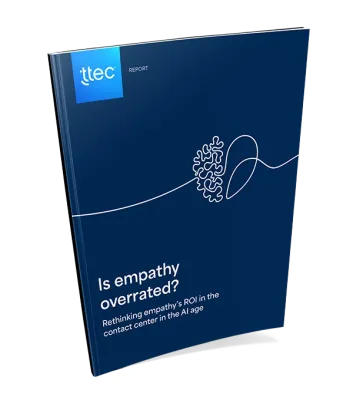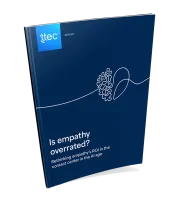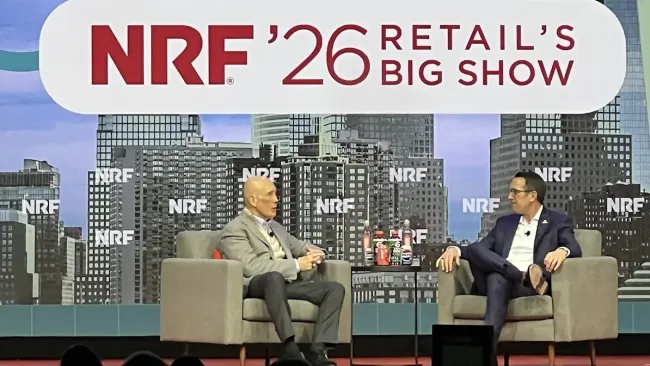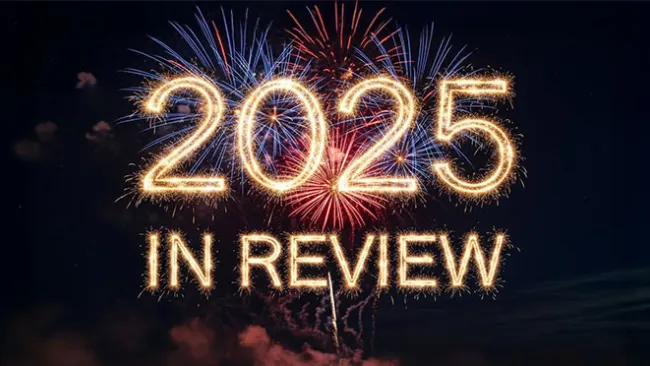Holiday shopping is in full swing. This year, AI begins to make its mark, and tariffs send shoppers to new channels. Coresight Research's John Harmon shares new research on the impact of tarriffs and consumer AI readiness this season. Happy shopping!

TRANSCRIPT
Liz Glagowski: Hi, everyone. Welcome to the CX Pod. I'm Liz Glagowski of the Customer Strategist Journal. It's that time of year again. The Hallmark Channel movies have begun and the holiday items are hitting the shelves. What will this year's holiday season look like, especially with tariffs and other unique circumstances this year? Well, here to talk about it and to discuss it with us is John Harmon, Managing Director of Technology Research at Coresight Research. Welcome to the program, John.
John Harmon: Thank you. Happy Shoptober. It's a pleasure to be here.
LG: I love it. I love it. So we're going to get into ins and outs of holiday shopping, which is starting to get on people's minds. And it seems like it's earlier and earlier every year. But before we do that, I'd love to just get a little introduction from you. Tell us a little bit about Coresight Research and then your role.
JH: Coresight Research is a research and professional services firm. Research is the foundation of what we do. We have a subscription research business that operates at the intersection of retail and technology. And that business informs our other professional services, such as working with startups, which we call innovators. We provide services for them. We'll collaborate with them on sponsored or co-branded research reports. We'll schedule events with them, such as dinners or cocktail parties at major retail events. We also have an advisory or consulting business, which privately works with companies doing research and other projects for them.
LG: How long have you been there and what do you do for them?
JH: I've been here since before the beginning. We spun out of the parent company of Li and Fung, the Fung Group in 2018. And I've been a, we were a research group with inside of Li and Fung covering retail and retail technology. And that's what we cover today. I've done both. I've covered a lot of retail, but a couple of years in, I started focusing on technology exclusively. because that's my background, but I cross the line and I cover retail from time to time as well.
LG: What is this year's holiday season going to look like? What have you guys found in your research about this year's holiday shopping season?
JH: It looks like a pretty normal holiday season with a lot of things that we're watching. We expect retail sales to be up 3 to 3.5% this year. That's a pretty normal year. And we think online retail sales, which always grow faster, will grow 5 to 6% this holiday season.
LG: With that information, are there any unique circumstances? Like we said, there's tariffs and there's other economic uncertainty. Is there anything that you're finding within that research that may have an effect this year that wouldn't have happened other years?
JH: Right. Consumers are shopping earlier this year. As of mid-October, 8.2% of consumers had already finished their holiday shopping, and 29.7% of consumers were still shopping. I mean, that means over half, 53.2% of consumers hadn't started shopping yet and have waited to the last minute.
We think there are a couple of reasons for this. As you mentioned, the tariff situation, I think a lot of consumers started shopping in the first quarter of the year. anticipation of tariffs. But there are a lot of good deals throughout the year, like Amazon Prime Day. There are two Amazon Prime Day holidays, Christmas in July. Consumers in general have been shopping quite a bit earlier since the pandemic. And at the beginning of the call, I said, happy Shoptober. The deals have started in October since the pandemic is really there was this other Amazon Prime Day event and the other major retailers jumped on the bandwagon and offered their de their deals as well. So Christmas holiday shopping season is is off and running already even before Halloween.
LG: Wow. So brands have anticipated this, I imagine. What can they do with this information or what are they doing with this information? What are some other brands doing to make sure that they can keep up with this kind of earlier season and all year long type of approach to holiday shopping?
JH: Consumers are nervous about tariffs as they should be. In one of our surveys in October, we found that 22% of consumers expect tariffs to have a big impact on their shopping plans. and 51.2% of consumers expecting tariffs to have a moderate impact. Together, that's almost three quarters of consumers.
Retailers understand this. They understand that consumers are sensitive about prices due to tariffs. So there are several measures that retailers can take. One, they can pass the tariffs on to consumers. That's not a very popular solution. They can put pressure on their suppliers to give them some better prices to offset it a bit.
We think that retailers stocked up early when they saw the tariffs coming. They placed their orders for holiday merchandise. As usual, they generally order several months in advance. And they can drop selling certain items that they know consumers won't buy due to the effect of tariffs. The impact from tariffs will be pretty moderate this holiday season because retailers have had time to prepare for it. But we think tariffs will be bigger in 2026.
LG: How is this going to maybe affect things after the holidays? And are there certain industry or sections, sectors of the retail market that are going to be more affected than others that you're seeing?
JH: We think the measures to offset tariffs they're limited in scope. Again, stocking up on merchandise early this year, that's going to run out in the holiday season or early next year. And then we'll see the full impact of tariffs. We saw a lot of stocking up of consumer electronics in the first quarter, like PCs and laptops. And in the meantime, they've gotten a bit of a pass on tariffs, those electronic products. But we think it's going to hit in a big way on clothing, on apparel and footwear next year.
We've seen several major retailers take down their financial guidance to investors due to the impact of tariffs. For example, Under Armour said the impact of tariffs would cost its bottom line $100 million. Well, its operating profit last year was $220 million. So it's going to cut it in half. And many other major retailers and brands have reduced their financial guidance due to the impact of tariffs.
LG: Do you see any best practices so far from retailers that have kind of taken this approach and made a plan of how they're attacking it in a positive way for their business?
JH: We saw this movie a bit before in the first term of the Trump presidency, where he was very, his policies were very aggressive against China. That was certainly a wake-up call to the apparel industry to diversify their manufacturing away from China. Maybe they thought it was short term, maybe they believed it, maybe they didn't, but some did diversify.
Unfortunately, the new set of tariffs generally targets a lot of other Asian countries where brands might have moved their manufacturing to. Vietnam and other countries. So there's only so much they can do. It's not something they can change overnight, change their manufacturing. It takes time to qualify a factory, get the equipment installed, make sure that the quality of the goods manufactured is good, set up transportation, logistics. There's no simple solution. That takes time. And you have to, it takes an investment as well. So if you're a brand, you have to believe that the tariff configuration is here to stay. It does seem to be pretty dynamic, though it makes it hard to make a business decision. So I think for the most part, retailers and brands have to have to ride it out.
LG: Do you see any brands taking an opportunity, the opportunity of this, like maybe a US-based brand that has built up a domestic infrastructure and logistics or other companies that are, you know, seeing this as some sort of, as a positive or using the opportunity part of it, not just the negative impact of it.
JH: Certainly the big retailers like Walmart and Target are best positioned to put pressure on their suppliers. to absorb any price increases, to take other measures that could offset tariffs, such as, for example, bringing up a retail media network. It's a source of incremental, very high margin revenue that could offset tariff pain, right?
I think one place we're going to see it, though, it's really going to hurt small brands and small manufacturers to the canceling of the dominimus exemption, right? If you're, if you want to buy a $200 sweater from a small brand in Italy, that opportunity is no longer available. Also, since a lot of shippers have ceased collecting de minimis goods from those countries, and many governments have ceased allowing it as well, because it's going to take some time for them to reprogram their systems to enable the collection of these tariffs.
So in the meantime, they've stopped accepting goods altogether. So certainly US consumers will be largely unable to buy under $800 goods from small brands that are overseas in the meantime. Therefore, they're going to have to go to domestic retailers and brands, right? Looking at tariffs, I mean, consumers do have other options too. If they're seeing tariffs expanding the price of goods to an uncomfortable level, they can go to the resale market, right, thrift stores or secondhand, or also go to discounters. They receive goods from other retailers that have already gotten in the country before, likely before the tariffs were in effect. So consumers have a lot of options to bypass tariffs. They're seeing them and they want to do that.
LG: What would you say are some of the biggest takeaways from the findings that are important for our audience?
JH: If you look at spending plans by income bracket, it's the consumers earning more than $100,000 a year who are the most positive about increasing their spending this holiday season. Even they are increasingly value conscious. Walmart, for example, is saying they're seeing more of these high-income shoppers than than ever before. But retailers should definitely target these shoppers. That's where the money is. They're the most positive, and we think they're the ones who are going to be supporting growth in holiday sales this year.
LG: What advice then do you have for retailers and for customers for this holiday season and beyond?
JH: A couple of things. I mean, obviously, smart shoppers shop all year long. The savvy ones, they're always looking for bargains, right? And hopefully, they took advantage of opportunities before the tariffs came into effect. Shopping holidays like Amazon Prime Day and other retailers following suit. Watch for the deals in October and on Black Friday and Cyber Monday. You know, shop around, of course. The internet is a great tool for price comparison more than ever.
In one of our recent consumer surveys, we found that 30% of consumers are going to use Chat bots like ChatGPT for shopping. That's yet another channel that they can use to compare products, compare prices, shop around, find new sources of product. Consumers have so many more ways, channels to buy goods than they ever have in the past. You can go to the physical store. You can go to the retailer's website. You can go look on social media. You can shop on TikTok. Now you can use ChatGPT, which has recently announced connections with the e-commerce websites of several retailers like Etsy, the Shopify platform, and most recently, and very important, Walmart, the world's largest retailer.
So there's so many tools out there. You can shop on social media, many, many places to shop. And again, as I mentioned, secondhand or resale or discount retailers.
LG: Have you started your holiday shopping yet?
JH: Heavens no. I wait till the last minute. I'm waiting for a lot of Black Friday discounts. Honestly, I found some things I want to buy and I went on a search engine to find out if they offered Black Friday deals last year and some of them do. So I'm setting foot until the Black Friday detail discounts come out.
But also, this is anecdotal. This is my personal impression, but I I feel like there were a lot more compelling bargains a year ago in October than there are. We've had the Amazon day and the other retailers following suit, but I don't feel like retailers are falling all over themselves this year to offer lower prices as they did last year. Maybe it's a game of chicken. They're all watching each other and they're waiting to see who does what. And once one of them breaks the ice, then they'll all jump on the bandwagon.
But I would say, yeah, again, my advice to consumers is at this point, you know, take your time, compare prices, maybe wait for some bargains and use the internet to compare prices and get intelligence on where you think prices are going to go on Black Friday.
LG: What do you want for Christmas? One last question.
JH: I'd like Santa to bring me a new watch. And that's the main thing I'm looking at. And I'm watching prices and Black Friday discounts, and I'm ready.
LG: Ready to share links with your family and friends. That's what I'm preparing to do.
JH: Oh, look at this watch, how pretty it is.
LG: Start dropping your hints. If you're not shopping for others, start dropping your hints for what you want with your family and friends.
JH: This year is going to be a watershed year for agentic commerce shopping with ChatGPT. Like I mentioned, 30% of consumers said they're going to use it one way or the other. It's not set up yet to be able to buy things on ChatGPT at every retailer. At this point, it shows you the products.
I think that ChatGPT offers a very good shopping experience as compared to other search engines. It shows you product images, it gives you recommendations, it shows summaries of the features. It's a really good experience. Agentic Commerce is really going to show its strengths this year and it'll be it'll be even bigger next year.
LG: I'm starting to see some of my friends are starting to use it and some other companies talking about agentic AI. Yeah. And then when they do make that connection, maybe next year, the year after of being able to buy it, and then agents shopping for you, there's a whole world out there that we'll see in the future.
JH: That's a whole other topic. There are things I want to buy that I don't want to be looking for every day. I'm hopeful that in the future, some will develop a shopping agent just for me that will hover out there on the internet and keep checking, checking or checking prices and notify me when the things that I want to buy are available or on sale. I go to a lot of retailers' e-commerce websites and I'm surprised because the things I buy again and again happen to be on sale and the retailer didn't tell me.
Or retailers send me blast emails for things I don't buy because they're just spray and pray blast emails. My agent could watch the things that I really want and let me know when new things become available or I might like something or they're on sale. I think shopping can get really powerful and really convenient and really great once these agents get fired up.
LG: Yeah, that personalized shopping experience that everyone talks about wanting to deliver. actually can happen. So John, thank you so much for your for your time today for a great conversation. I look forward to a great holiday season for everyone. And thanks for your insight. I better get shopping because I feel like I'm very much behind based on the research. So thanks again. And thanks to our audience for listening. So happy holidays, everybody.
JH: Thank you. Happy shopping, everyone.














